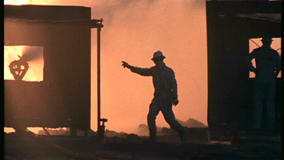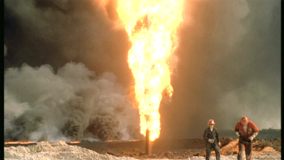|
Newest Reviews:
New Movies -
The Tunnel
V/H/S
The Tall Man
Mama Africa
Detention
Brake
Ted
Tomboy
Brownian Movement
Last Ride
[Rec]³: Genesis
Hara-Kiri: Death of a Samurai
Indie Game: The Movie
Abraham Lincoln: Vampire Hunter
Old Movies -
Touki Bouki: The Journey of the Hyena
Drums Along the Mohawk
The Chase
The Heiress
Show
People
The Strange Affair of Uncle Harry
Pitfall
Driftwood
Miracle Mile
The Great Flamarion
Dark Habits
Archives -
Recap: 2000,
2001, 2002,
2003, 2004
, 2005, 2006,
2007 , 2008
, 2009 ,
2010 , 2011 ,
2012
All reviews alphabetically
All reviews by star rating
All reviews by release year
Masterpieces
Screening Log
Links
FAQ
E-mail me
HOME
| |
Lessons of Darkness (Werner Herzog) 1992
 One of the few films that truly deserves
to be labeled with the adjective “astonishing”, Werner Herzog’s 1992
documentary Lessons of Darkness uses the fallout of the Gulf War to present what
is one of the finest examples of the singular director’s brand of stark-raving
poetry. Though shot in contemporary times, the horrific destruction and
consistently distanced humanity on display make the movie feel more like a work
of sophisticated science-fiction than an examination of current events. The
footage that Herzog has shot mainly focuses on the blazes in the oil fields of
Kuwait. It uses sheer scale to put the conflict into perspective while
demonstrating both the awesome power of nature, especially fire, and our primal
attraction to its beauty. Glorious helicopter shots of oil coated expanses
reveal a seemingly hopeless world of decay, where men scramble about trying to
fix a cataclysm. The voiceover, comprised of Herzog’s musings, casts it all
into sharp relief. One of the few films that truly deserves
to be labeled with the adjective “astonishing”, Werner Herzog’s 1992
documentary Lessons of Darkness uses the fallout of the Gulf War to present what
is one of the finest examples of the singular director’s brand of stark-raving
poetry. Though shot in contemporary times, the horrific destruction and
consistently distanced humanity on display make the movie feel more like a work
of sophisticated science-fiction than an examination of current events. The
footage that Herzog has shot mainly focuses on the blazes in the oil fields of
Kuwait. It uses sheer scale to put the conflict into perspective while
demonstrating both the awesome power of nature, especially fire, and our primal
attraction to its beauty. Glorious helicopter shots of oil coated expanses
reveal a seemingly hopeless world of decay, where men scramble about trying to
fix a cataclysm. The voiceover, comprised of Herzog’s musings, casts it all
into sharp relief.
 Herzog isn’t exactly an inhumane
director, but he’s one who doesn’t presuppose man’s superiority to nature,
much less one man’s superiority over another man. He’s scarcely interested
in the war itself. He relegates the actual conflict to just one of the film’s
thirteen chapters. The footage of the war that he shows, which lasts less than a
minute in duration, is a series of shots of bombs falling on cities, made all
the more unreal by the videogame-like filter of the night vision camera.
Grandiose music swells during this assault, but it’s the same bombast that is
heard later, as the firefighters attempt to contain the war’s aftermath. At
first it may seem that the transcendent images that Herzog has captured are
glorifying the results of the conflict, or perhaps only working as sheer
spectacle, but as the film moves on, and we encounter a few of the (usually
dumbstruck) actual people involved in this conflict, the movie emerges as a
powerful anti-war statement, in which an almost bemused distance from the
subject becomes roughly analogous with dismissal of it. The ability of these
images and juxtapositions to create awe is in no way reduced by the film’s
basis in reality, perhaps because Herzog has always shaped the physical world to
suit his storytelling needs, even in his fictional films. His tendency to find
resonant metaphor in the world’s oddities is one of the prime elements of his
genius, and by showing the scorched earth of Kuwaiti oil fields, he presents an
almost literal, and unshakable, hell on earth. Herzog isn’t exactly an inhumane
director, but he’s one who doesn’t presuppose man’s superiority to nature,
much less one man’s superiority over another man. He’s scarcely interested
in the war itself. He relegates the actual conflict to just one of the film’s
thirteen chapters. The footage of the war that he shows, which lasts less than a
minute in duration, is a series of shots of bombs falling on cities, made all
the more unreal by the videogame-like filter of the night vision camera.
Grandiose music swells during this assault, but it’s the same bombast that is
heard later, as the firefighters attempt to contain the war’s aftermath. At
first it may seem that the transcendent images that Herzog has captured are
glorifying the results of the conflict, or perhaps only working as sheer
spectacle, but as the film moves on, and we encounter a few of the (usually
dumbstruck) actual people involved in this conflict, the movie emerges as a
powerful anti-war statement, in which an almost bemused distance from the
subject becomes roughly analogous with dismissal of it. The ability of these
images and juxtapositions to create awe is in no way reduced by the film’s
basis in reality, perhaps because Herzog has always shaped the physical world to
suit his storytelling needs, even in his fictional films. His tendency to find
resonant metaphor in the world’s oddities is one of the prime elements of his
genius, and by showing the scorched earth of Kuwaiti oil fields, he presents an
almost literal, and unshakable, hell on earth.
92
12-12-03
Jeremy Heilman
|